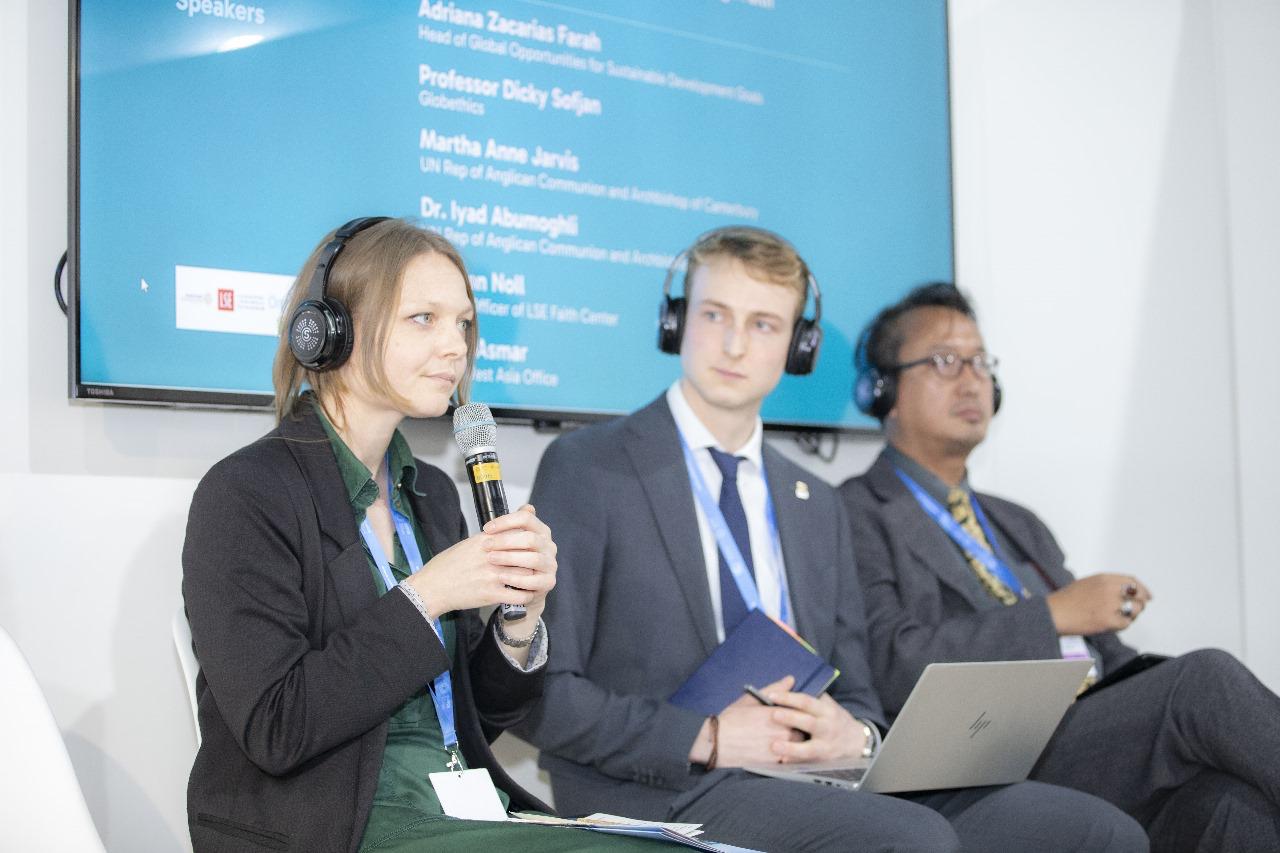جناح الأديان في COP29 يختتم فعالياته بالدعوة إلى تحقيق العدالة المناخية وتمكين المرأة والشباب وتعزيز التعاون بين الأديان للتوعية بقضايا المناخ
اختتم جناح الأديان، الذي ينظمه مجلس حكماء المسلمين، في الدورة التاسعة والعشرين من مؤتمر الأطراف في اتفاقية الأمم المتحدة الإطارية بشأن التغير المناخي COP29، بالعاصمة الأذربيجانية باكو، فعالياته بتأكيد ضرورة العمل على تحقيق العدالة المناخية وتمكين المرأة والشباب ودعم الفئات الأكثر عرضة لتداعيات تغير المناخ، وإيجاد حلول مستدامة لمواجهة الأزمات البيئية والاستفادة من المعرفة التقليدية للشعوب الأصلية وتعزيز التعاون بين الأديان في مواجهة الأزمة المناخية وتحقيق التوازن بين الإنسان والطبيعة.
وعقد جناح الأديان على مدار أسبوعين أكثر من 54 جلسة حوارية ونقاشية قدمها ما يزيد على 230 متحدثًا من خلفيات متنوعة، ضمن تحالف عالمي ضم 97 منظمة تمثل 11 ديانة وطائفة من مختلف أنحاء العالم، وذلك بالتعاون مع وزارة التسامح والتعايش في دولة الإمارات العربية المتحدة، وبرنامج الأمم المتحدة للبيئة، ورئاسة مؤتمر الأطراف COP29، وإدارة مسلمي القوقاز، ومركز حمد العالمي للتعايش السلمي، ومؤتمر زعماء الأديان العالمية والتقليديَّة بكازاخستان؛ حيث شهدت فعاليات الجناح زخمًا كبيرًا ومشاركات متنوعة وإشادات واسعة من رواد COP29 بالدور المحوري الذي يقدمه الجناح في إبراز أهمية مساهمة قادة الأديان في الجهود المناخية العالمية، وما يمثله من نموذج ملهم للتعاون بين مختلف المعتقدات في مواجهة التحديات البيئية المشتركة.
وأكد الأمين العام لمجلس حكماء المسلمين، سعادة المستشار محمد عبد السلام، أن جناح الأديان في COP29 جسَّد تجربة استثنائية لدور الأديان في معالجة التحديات المناخية، مشيرًا إلى أن الأزمة المناخية ليست مجرد تحدٍّ علمي أو اقتصادي فحسب، بل اختبار حقيقي للوعي العالمي ومسؤوليته الأخلاقية، مشيرًا إلى أن جناح الأديان في COP29 بعث رسالة مهمة مفادها أنَّ القيم الدينية يمكن أن تتحول إلى قوة ملهمة تدفع باتجاه إحداث تغيير جذري ومستدام، موجهًا الشكر لجمهورية أذربيجان وللسيد الرئيس إلهام علييف، رئيس أذربيجان، على دعمه لمبادرة جناح الأديان في COP29 موضحًا أن مجلس حكماء المسلمين ملتزم بمواصلة العمل على تفعيل دور قادة الأديان ضمن جهود العمل المناخي والبناء على نجاح تجربة جناح الأديان في COP28 و COP29 لتحقيق نتائج ملموسة تعيد التوازن بين الإنسان والطبيعة، وتحمي كوكبنا بيت الإنسانية المشترك.
وكانت قضية تعزيز العدالة المناخية محورًا رئيسيًّا في نقاشات جناح الأديان؛ حيث تمت الدعوة إلى ضمان وصول الموارد اللازمة إلى المجتمعات والدول الأكثر تضررًا من الكوارث البيئية، وأهمية دعم المشروعات المحلية التي تعزز التكيف مع المناخ وتخفف من حدة آثاره المدمرة، وبناء شراكات مستدامة بين المؤسسات المحلية والإقليمية، والاستفادة من المعرفة التقليدية للمجتمعات في التعامل مع الكوارث البيئية؛ بهدف إيجاد حلول مبتكرة تحترم الثقافات المحلية وتعزز من قدرتها على مواجهة التغيرات المناخية.
كما ركزت الجلسات على أهمية تمكين المرأة في مواجهة أزمة المناخ، باعتبارها في الخطوط الأمامية للتعامل مع تداعياته في المجتمعات المحلية؛ حيث ركز المشاركون على الحاجة الملحَّة إلى تفعيل دور المرأة كعنصر قيادي قادر على صياغة وتنفيذ حلول مبتكرة للتحديات البيئية، وانطلاقًا من أهمية هذا الدور شهد جناح الأديان إطلاق التحالف العالمي للقيادات النسائية الدينية من أجل المناخ، الذي يمثل منصة لتعزيز دور المرأة القيادية في المجتمعات الدينية وتمكينها من مواجهة التحديات المناخية.
وحظي الشباب أيضًا باهتمام كبير خلال الجلسات الحوارية التي أكدت أهمية استثمار الطاقات الشبابية في تطوير حلول مستدامة ترتكز على الابتكار والتكنولوجيا، والدعوة إلى إشراكهم بشكل أكبر في عمليات صنع القرار المتعلقة بالمناخ، من خلال تزويدهم بالمهارات والخبرات اللازمة عبر برامج تدريبية وورش عمل، تتيح لهم المشاركة بفعالية في صياغة وتنفيذ المشاريع البيئية على المستويات المحلية والدولية. بما يسهم في بناء مجتمعات أكثر وعيًا واستعدادًا لمواجهة الأزمات المناخية المستقبلية.
وفي السياق ذاته، أكَّدت النقاشات التي شهدها جناح الأديان الحاجة الملحَّة إلى دمج القضايا المناخية في المناهج الدراسية لتثقيف الأجيال الناشئة حول أهمية حماية البيئة ومواردها الطبيعية لتشكل حجر الزاوية في جهود بناء الوعي العالمي حول الممارسات البيئية المستدامة، بالإضافة إلى تعزيز الشراكة والتكامل بين القيم الدينية والمعرفة العلمية لتطوير إستراتيجيات فعالة لمواجهة التغير المناخي، والاستثمار في أنظمة الإنذار المبكر، بما في ذلك تطوير تقنيات متقدمة لمراقبة المخاطر البيئية والتحذير منها قبل حدوثها، بما يسهم في تقليل الخسائر والأضرار، خاصة في المناطق التي تواجه كوارث طبيعية متكررة مثل الفيضانات والجفاف.
وانعقدت في العاصمة الأذربيجانية باكو، خلال الفترة من 11 إلى 22 نوفمبر الجاري، فعاليات الدورة التاسعة والعشرين من مؤتمر الأطراف في اتفاقية الأمم المتحدة الإطارية بشأن التغير المناخي COP29، التي شهدت العديد من الفعاليات التي تؤكد على ضرورة حشد الجهود الدولية في مواجهة تحدي المناخ.

